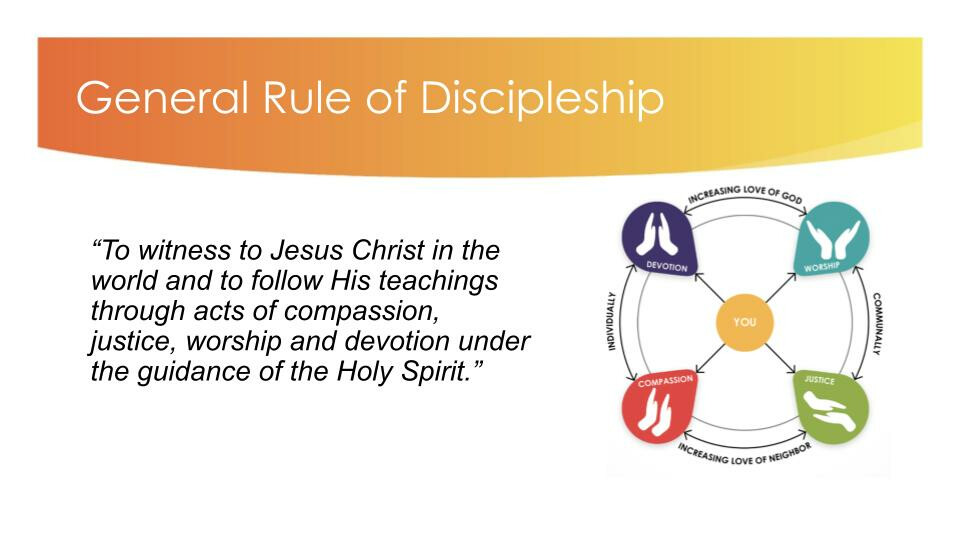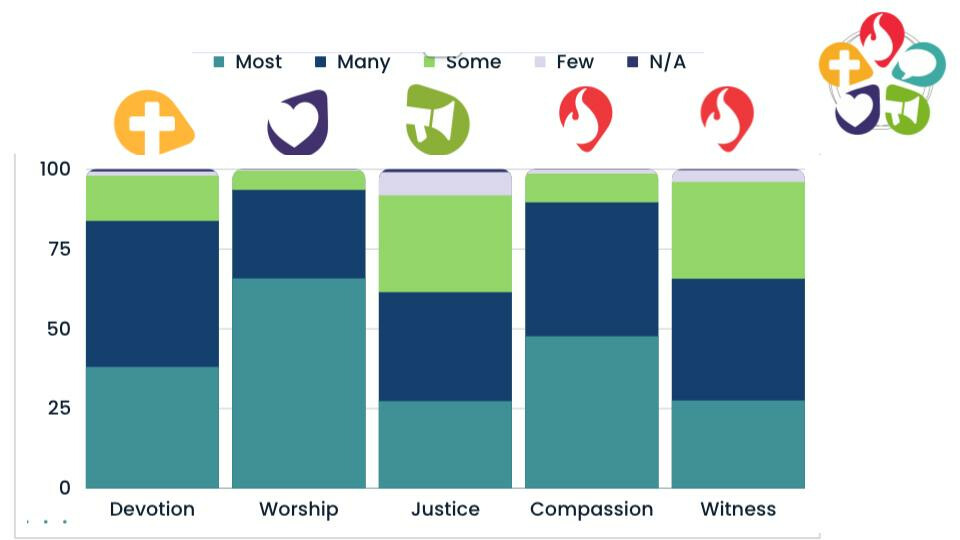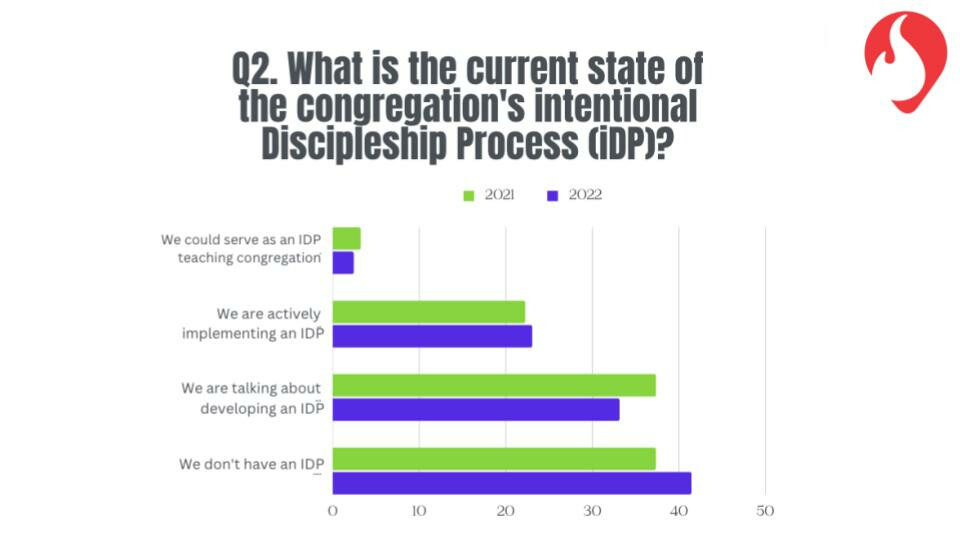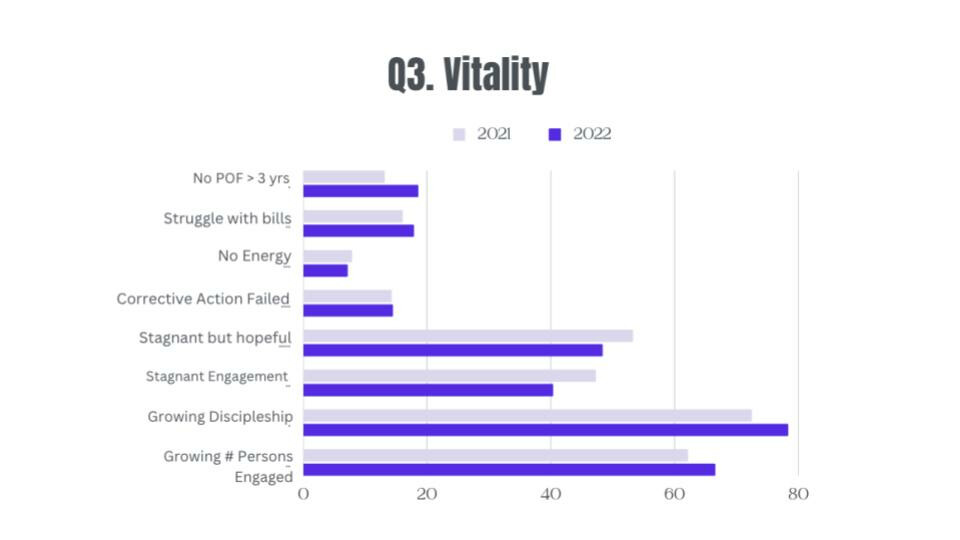Discipleship Council Report 2023
Over the past seven years, the Discipleship Council has helped realign the conference boards, launched our antiracism work, and re-rooted our focus on world-transforming discipleship.
This past year, we continued to focus our work on the mission and vision of the Annual Conference: the Baltimore-Washington Conference inspires and equips local faith communities to develop disciples of Jesus Christ for the transformation of the world so that more transformed lives transform lives. Deepening discipleship is at the heart of everything we do. Our discipleship ministry boards–leader development, new faith expressions, young people’s ministry, advocacy and action, and wellness and missions — all are rooted in the fact that our ministry is all about love.
During our time of reflection about ministry outcomes over the past several years, we celebrated the beneficial ways that the Discipleship Ministries Report from local churches is being used to align the work of the Discipleship boards and Annual Conference resources to support the vitality of local churches. We also acknowledged how this faithful work will continue to be nurtured going forward as we encouraged our Discipleship Agency Boards in their work to support 100 percent of churches becoming 100 percent vital.

This vitality includes deepening discipleship, seeing all the people, living and loving like Jesus, and multiplying impact through Missional Action Planning.
As a part of our work to check on the alignment of ministries to our mission, we have been monitoring the data provided by churches on the Discipleship Ministries Report submitted and celebrated during church conference season.
Question #1 is designed to measure the degree to which churches are witnessing to Jesus Christ through acts of justice, compassion, devotion and worship under the guidance of the Holy Spirit.

This year we celebrate gains made in more fully embracing the totality of discipleship.
There seems to be more consistent discipling behavior across all five aspects: witnessing, compassion, justice, worship and devotion.

We celebrate the more holistic living out of discipleship and the increased numbers and stories of transformation from people engaged in conference-wide ministries of advocacy, wellness and missions.
Question #2 asks, What is the current state of the congregation’s intentional discipleship process? The Leadership Development Board contacted each church that indicated that they could serve as an intentional discipleship process teaching congregation in 2021 and in the process provided feedback and additional training for congregations. We are able to see the ways that the faithful work of The Leadership Development Board is bearing fruit in helping congregations develop, maintain, and strengthen an intentional discipleship process.

Specifically, we celebrate that: 1% more churches are actively implementing an intentional discipleship process. While more churches are reporting not having an intentional discipleship process this year than last year, we believe that this is due to an increased awareness of what that entails.
In reviewing the data from the Discipleship Ministries Report, we noticed an interesting correlation between the strength of a congregation’s intentional discipleship and their overall vitality.
Question #3 of the report asks congregations to select all statements which best describe the congregation’s level of vitality.

There were some shifts in vitality reporting including:
- 5% fewer churches have had a profession of faith in the past three years
- 2% more churches are struggling to pay their bills
- 5% fewer churches are stagnant but hopeful
- 7% fewer churches with stagnant engagement
- 5% more churches growing in discipleship
- 4% more growing number of persons engaged.
The work with the Congregational Vitality Pathways has been especially instrumental in helping congregations achieve 100% vitality. Churches participating in the initiatives work from an assessment specific to their congregations and, with the assistance of a guide, develop goals that lead to greater vitality. Through Congregational Vitality Pathways, the congregations can see progress and decide next steps. As each congregation works with a guide, the feedback on the congregational progress is timely.

Congregations that classify themselves as potential teaching congregations (for developing an intentional discipleship process) are significantly more vital across almost all dimensions than those that do not. 100% of the congregations who identify as potential teaching churches also say they are growing in discipleship, growing in the number of persons who are engaged, and are all on a path to racial justice. None report being in decline or being stagnant; 92% aren’t struggling to pay the bills and have experienced professions of faith for the past three or more years.
Look at what happens when congregations keep the main thing the main thing! Amidst the changing landscape of our world, communities and denomination, we are called to remain focused on bearing fruit that will last. We achieve this through our faithful work in deepening discipleship, seeing all the people, living and loving like Jesus, and multiplying impact.
We will most certainly continue to experience the impact of COVID-19 and the process of Disaffiliation in many areas across our denomination, Annual Conference and local congregations. Amid any uncertainty, angst or trepidation we feel, let us hold fast to that which is constant and ever before us - Christ’s commission to us to Go therefore and make disciples of all nations, baptizing them in the name of the Father, and of the Son, and of the Holy Spirit. As we live into this call, we are assured that Christ will be with us wherever we go.
Question #4 starts with an excerpt from the United Methodist Constitution on Racial Justice in the Book of Discipline. Then invites congregations to describe where they are with regards to racial justice.

- 1% fewer report that they are on a pathway to racial justice. We still celebrate the more than 80% of our congregations who are.
- There is a slight increase in the number of pastors who preach on racial justice at least once a month
- 1% more congregations report monthly dialogue and learning opportunities
We celebrate the evolution of this work as we listened to leaders struggle to make this real in their contexts. Brave Conversation Resourcers stand ready to support leaders and congregations who ask for help and/or would like support.
Question #5 asks congregations to share the ways that they are creating spaces of belonging and Beloved Community through inclusion, diversity and equity.

- 7% more congregations report being shaped by the community in all of its dimensions of diversity
- 3% fewer congregations report including young people in ministry through providing leadership and voice
- 6% fewer report that their church building is accessible, from entry throughout the interior spaces, to people of a variety of physical abilities. This is likely due to the difference between front door accessibility and full church accessibility.
- We celebrate that 82% of our congregations are working with participants, members and persons who use the space to create accommodations that enable them to fully engage in the life of the congregation. That represents a more than 3% increase from last year
- 3% more congregations with different languages and/or nations represented in their congregation are finding ways to incorporate all participants’ cultures into their common, collective culture.
We celebrate the good work at many levels to grow in awareness and action to be and build beloved community, from accessibility audits to engagement that leads to more just and inclusive behavior. And we continue to prayerfully seek to mitigate the effects of Covid on children, family and youth ministry at local church and conference levels even as we celebrate gains in campus ministries.
We thank God for the ways that the realignment of ministry is bearing fruit and for the tenacity of our churches and conference boards and agencies amid significant changes in social and denominational landscapes. Our Discipleship Boards have continued to work to advance local church mission and vitality as well as create more synergy with one another.
Finally, as our Missional Action Planning — otherwise known as MAP — builds momentum and the conference and congregations more actively seek to be good stewards of our God-given resources for the good of our communities, we anticipate more work for the BWC MROC team. The Ministry Relationship Oversight Committee of the Discipleship Council is a standing committee of the Discipleship Council whose purpose is to review, recommend and oversee the process for entities seeking to establish a ministry relationship with the BWC. This year MROC reviewed the contract with Charge Enterprises as the preferred provider for churches that want to provide electric charging stations on their church property.
As the Greater Washington District’s Affordable Housing Committee begins to provide consultations for churches outside the district, we anticipate bringing ministry agreements to the 2024 Annual Conference regarding these consultation services and free feasibility studies from Georgetown University.
Thank you for receiving this information about our shared ministry together. We hope you see – as we do – that it’s all about love.
